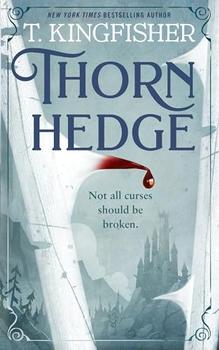Summary | Excerpt | Reviews | Beyond the Book | Readalikes | Genres & Themes | Author Bio

CHAPTER 1
In the early days, the wall of thorns had been distressingly obvious. There was simply no way to hide a hedge with thorns like sword blades and stems as thick as a man's thigh. A wall like that invited curiosity and with curiosity came axes, and it was all the fairy could do to keep some of those curious folk from gaining entrance to the tower.
Eventually, though, the brambles had grown up around the edges—blackberry and briar and dog rose, all the weedy opportunists—and that softened the edge of the thorn wall and gave the fairy some breathing room. Roving princes and penniless younger sons had been fascinated by the thorns, which were so obviously there to keep people out. Hardly anybody was interested in a bramble thicket.
It helped, too, that the land around the thorns became inhospitable. It was nothing so obvious as a desert, but wells ran dry practically as soon as they had been dug, and rain passed through the soil as if it were sand instead of loam. That was the fairy's doing, too, though she regretted the necessity.
The fairy was the greenish-tan color of mushroom stems and her skin bruised blue-black, like mushroom flesh. She had a broad, frog-like face and waterweed hair. She was neither beautiful nor made of malice, as many of the Fair Folk are said to be.
Mostly she was fretful and often tired.
"How do they know?" she asked miserably. "Everyone who knew her should be dead of old age by now—them and their children, too! Their grandchildren should be gray-haired. How do they even remember there's a tower here?"
She was talking, more or less, to a white wagtail, a little bird that liked short grass and pumped its tail constantly as it walked. Wagtails were not so clever as rooks or jackdaws or carrion crows, but the fairy liked them. They did not make fun of her like the crows would, nor carry tales the way that the rooks did.
The wagtail scurried closer, pumping its tail up and down.
"They must be telling stories," said the fairy hopelessly. "About a princess in a tower and a hedge of thorns to keep the princes out."
She wiped her eyes. She knew that her eyelids were turning blue-black in response to the unshed tears.
There was no one to see her except the wagtail, but she pinched the bridge of her nose and tilted her head back anyway. The old habits were still with her.
"I can't fight stories," she whispered, and a few tears, dark as ink, ran down her face and tangled in her hair.
But time did pass and perhaps the stories were told less often. Fewer men came to the thorn hedge with axes. The wagtails left, because they preferred open country, and the fairy was sorry to see them go. Jays moved in, flitting through the thorns and blistering the air with their scolds. They were shy and spooked easily, for all their cursing. The fairy recognized kindred spirits, as she still spooked easily herself.
As the years trickled away and the thorns filled with dog roses, her soul grew easier. There were stones inside her heart that would never stop grinding together, but they did not weigh so heavily in the years when no princes came.
The fairy was filled with dread when she heard the ringing of nearby axes. She crouched in the brambles, toad-shaped, motionless, thinking, What will I do if they come nearer?
But they did not come nearer. They cut a road through the woods but gave the brambles a wide swath. The tower had been built on a rocky hill—a good, defensible place for a castle, but not a good place for a road. The axe bearers cut south instead, in a long curve, over what had once been fields held by the plow.
The fairy was afraid for a long time that the coming of the road would mean the coming of more princes and younger sons, but mostly what it brought were merchants and travelers. None seemed interested in forcing their way through a massive bramble thicket, and perhaps none of them made the connection about how much land the brambles covered, or stopped to wonder what such a dense growth might conceal.
Copyright © 2023 by Ursula Vernon
Your guide toexceptional books
BookBrowse seeks out and recommends the best in contemporary fiction and nonfiction—books that not only engage and entertain but also deepen our understanding of ourselves and the world around us.